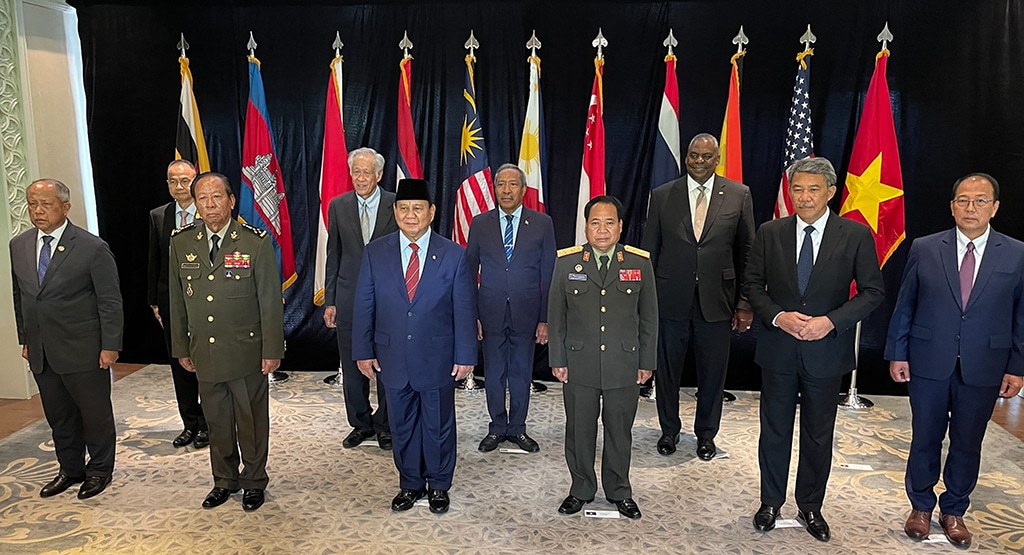SINGAPORE: US Secretary of Defense Lloyd Austin said Saturday it was “essential” to renew dialogue with China to avoid “misunderstandings” that could lead to a conflict between the two superpowers. The United States had invited Austin’s Chinese counterpart Li Shangfu to meet on the sidelines of a defence summit in Singapore, but the Pentagon said Beijing declined. A member of China’s delegation told AFP that the removal of US sanctions on its minister is a precondition for talks.
“The United States believes that open lines of communication with the People’s Republic of China are essential — especially between our defense and military leaders,” Austin told the Shangri-La Dialogue. “The more that we talk, the more that we can avoid the misunderstandings and miscalculations that could lead to crisis or conflict.” Austin is on a tour of Asia that previously took him to Japan and will also include a visit to India — part of a push by top US officials to shore up regional alliances and partnerships to help counter a more assertive China and an increasingly bellicose North Korea.
In his speech Saturday, Austin said he was “deeply concerned that (China) has been unwilling to engage more seriously on better mechanisms for crisis management between our two militaries”, expressing hope that this would soon change. Li, who will address the meeting on Sunday, was sanctioned by the US government in 2018 for buying Russian weapons, but the Pentagon says that does not prevent Austin from conducting official business with him. Members of the Chinese delegation hit back swiftly over Austin’s remarks, with Senior Colonel Tang Hefei, spokesperson for China’s defense ministry, saying that the Pentagon chief “made several false accusations”.
Another Chinese delegation member, Senior Colonel Zhao Xiaozhuo, said Washington had no business telling China what to do. “What we do in the Chinese military is based on maintaining the core interests of China’s security, which is fundamental,” he said. Zhao said removing the sanctions on Li is “one of the pre-conditions for substantial talks” with Austin. Tensions between Washington and Beijing have soared this year over issues including Taiwan and an alleged Chinese spy balloon that was shot down by a US warplane after traversing the country. Austin and Li shook hands and spoke briefly for the first time at the opening dinner on Friday, but there was no substantive exchange.
While high-level military-to-military ties between the United States and China have been cut off for months, other top US officials are still in communication with Beijing. CIA Director William Burns made a secret trip to China last month, while US National Security Advisor Jake Sullivan and top Chinese diplomat Wang Yi met in Vienna in May. ‘Risky intercepts’ Austin also took aim at Beijing for conducting “an alarming number of risky intercepts of US and allied aircraft flying lawfully in international airspace”, including one last week. In that incident, the US military said a Chinese fighter pilot performed an “unnecessarily aggressive” maneuver near a US surveillance aircraft over the South China Sea.
Video footage released by the US military showed a Chinese jet crossing in front of the US aircraft, which could be seen shaking from the resulting turbulence. But China’s military said the US plane “broke into” a military training area. Another recent flashpoint in China-US relations has been high-end microchips. Beijing said last month that US semiconductor giant Micron had failed a national security review and would not be allowed to sell to operators of “critical information infrastructure”. Indonesia proposes peace plan Meanwhile, Ukraine’s defense minister on Saturday dismissed a plan proposed by his Indonesian counterpart to end the war between Kyiv and Moscow, calling it a “strange” proposal.
Indonesian Defense Minister Prabowo Subianto pitched the idea at the Shangri-La Dialogue defense summit in Singapore where he was a speaker. The plan included an “immediate cessation of hostilities”, a ceasefire “at present positions”, and demilitarized zones that would be guaranteed by observers and United Nations peacekeeping forces. He also suggested an eventual “referendum in the disputed areas” organized by the UN. But Ukrainian Defense Minister Oleksii Reznikov, who was attending the two-day summit, flatly rejected the proposal.
“It sounds like a Russian plan, not Indonesian plan,” he said. “We don’t need this mediator coming to us (with) this strange plan.” China has presented its own peace plan to end the war — a vague list of proposals to which European Union politicians have reacted with skepticism. While Beijing says it is a neutral party to the conflict, it has been criticized for refusing to condemn Moscow’s invasion. In contrast, the United States and Western allies have delivered billions of dollars in weapons and other aid to Ukraine since Russia’s invasion. Jakarta, which favors non-aligned diplomacy, had previously attempted to mediate peace.
Indonesian President Joko Widodo travelled to Kyiv and Moscow and met the nations’ leaders last year, while his country chaired the G20 bloc of major economies. Subianto’s proposal was also criticized at the summit on Saturday by EU foreign policy chief Josep Borrell. “We need to bring peace to Ukraine”, but it must be a “just peace, not a peace of surrender,” Borrell said, commenting on the Indonesian proposal. Indonesia voted in favor of a UN resolution condemning Russia’s invasion of Ukraine, but it has not applied economic sanctions against Moscow. – AFP











